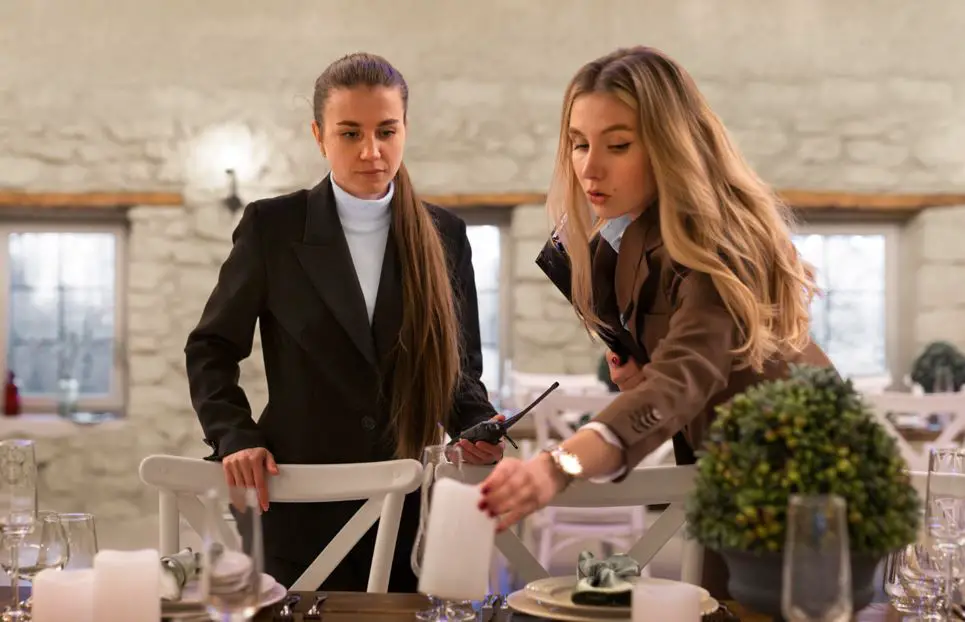Planning a wedding is a journey filled with countless decisions, excitement, and a fair share of stress. For couples who’ve taken on the planning themselves, there’s often a need for that final helping hand to ensure everything unfolds perfectly on the big day.
That's where a day-of wedding coordinator steps in, bridging the gap between meticulous preparation and smooth execution.
From managing vendor schedules to coordinating the wedding party and directing guests, a day-of coordinator can be the key to a seamless experience. In this guide, I’ll outline the responsibilities, benefits, and things to consider when choosing a day coordinator.
Whether you're a DIY couple or simply want peace of mind on your wedding day, understanding this role can be the assurance you need to enjoy every moment.
Let's get straight to the point
For couples who’ve planned their wedding themselves, a day-of coordinator brings that final touch to ensure everything runs seamlessly. They handle last-minute timeline adjustments, manage vendors, oversee setup, and guide guests so couples can fully enjoy the celebration.
Though not involved in early planning, they’re skilled at executing details, solving any surprises that arise, and keeping things on schedule.
When choosing a coordinator, look for experience, strong communication skills, and a proactive approach to emergencies.
Ideal for DIY or budget-conscious couples, a day-of coordinator provides essential support for a stress-free, memorable wedding.
Responsibilities Of A Day-Of Wedding Coordinator

1. Finalising The Timeline And Event Flow
- Review the wedding day timeline, confirming that all events—such as the ceremony, cocktail hour, and reception—are scheduled and coordinated precisely.
- Works with the couple to adjust the timeline, allowing for buffer times and ensuring a smooth event flow.
2. Coordinating Vendors
- Serves as the primary point of contact for vendors on the wedding day.
- Ensures vendors arrive on time, have necessary directions, and know their roles and schedules. They troubleshoot any vendor-related issues to prevent disruptions.
3. Managing Setup And Decoration
- Oversees the setup of the ceremony and reception spaces, ensuring decor aligns with the couple's preferences.
- Works with the venue to place items, manage layouts, and ensure everything is in place before guests arrive.
4. Directing Guests And The Wedding Party
- Guides the wedding party on timing, entry, and positioning for the ceremony and key reception events.
- Assists guests, ensuring they know where to go for each part of the event, and answers questions about the day’s schedule.
5. Problem-Solving On-The-Spot
- Handles unexpected issues like weather changes, misplaced items, or last-minute adjustments.
- Keeps emergency supplies and vendor contacts ready to address any potential disruptions.
Pros Of Hiring A Day-Of Wedding Coordinator
Day-of coordinators provide many benefits, particularly for couples who have taken on the bulk of planning and want a professional to handle the day’s details. Here are some notable advantages:
1. Reduced Stress For Couples And Families
- The couple and their families can enjoy the day without focusing on managing logistics.
- Minimises stress by taking charge of timing, vendors, and guest coordination.
2. Ensures Timely And Seamless Execution
- A day-of coordinator ensures the schedule is followed closely, avoiding delays and missed events.
- Maintains the flow of the day, coordinating vendor activities and keeping everything on track.
3. Cost-Effective For Budget-Conscious Couples
- Compared to a full-service planner, a day-of coordinator is a more affordable choice.
- Couples can save on planning costs by doing much of the work and relying on a coordinator to handle the day.
4. Perfect For Diy Couples
- Ideal for couples who prefer a hands-on approach to planning but need support to execute on the day.
- Allows DIY couples to realise their vision while ensuring all details come together smoothly.
5. Professional Assistance For A Memorable Day
- Provides couples with the reassurance that a trained professional is handling the day’s important details.
- Ensures each moment is captured and celebrated as planned, without stress or complications.
Cons Of Hiring A Day-Of Wedding Coordinator
While a day-of coordinator offers significant benefits, some couples may find limitations. Here are a few potential drawbacks to consider:
1. Limited Involvement In The Planning Process
- A day-of coordinator is usually involved only in the final days or weeks before the wedding.
- They may not be familiar with all the nuances of the couple’s vision or the pre-planning decisions, which could lead to slight inconsistencies.
2. Not Ideal For Highly Complex Weddings
- For elaborate weddings with many moving parts, a day-of coordinator may need to be equipped to manage everything.
- For better coordination, complex, multi-day events or weddings with multiple vendors may require a full-service planner.
3. Communication And Preparation Depend On The Couple
- Couples must clearly outline their vision and preferences well in advance.
- Miscommunication can occur if the coordinator isn’t involved in the planning stages, so it's essential for the couple to be clear on all details.
4. Limited Creative Input
- A day-of coordinator’s role is primarily logistical. They are focused on execution, not design or decor.
- Couples seeking creative advice or thematic input may need additional support from a designer or full-service planner.
Essential Considerations When Choosing a Day-of Coordinator

When selecting a day-of coordinator, assessing their experience, problem-solving approach, and familiarity with the venue is essential.
1. Experience And Familiarity With Wedding Venues
- Opt for coordinators with substantial experience in weddings similar to yours and, ideally, those familiar with your venue.
- Experienced coordinators are generally better at handling last-minute issues and are well-versed in wedding-day logistics.
2. Communication And Responsiveness
- Look for coordinators who are proactive communicators, prompt, and willing to discuss your needs well before the event.
- Good coordinators will schedule pre-wedding meetings to review the timeline and clarify details, ensuring smooth coordination.
3. Comprehensive Service Package And Clearly Defined Scope
- Please review the services included in the coordinator’s package, as some may offer additional consultations or timeline creation.
- To avoid misunderstandings, clarify any areas the coordinator will not cover, such as vendor selection or creative input.
4. Emergency Preparedness And Backup Plans
- Ask coordinators about their approach to handling emergencies, like weather changes or vendor delays.
- A prepared coordinator will carry essential supplies and have a backup plan in place, ensuring the event is not disrupted.
5. Check References And Past Client Feedback
- Reading reviews or requesting references can provide insight into the coordinator’s organisational skills and professionalism.
- Positive feedback on their ability to handle challenges and keep the event on track is a good sign of reliability.
Practical Tips for Working with Your Day-of Coordinator
To get the best results from your day-of coordinator, working together effectively is essential. Here are some ways to prepare for a successful partnership:
1. Create A Detailed Wedding Timeline
- Prepare a comprehensive schedule of the day’s events, from the ceremony start time to the final dance.
- Include buffer times to account for minor delays or transitions between events.
2. Organise Vendor Contracts And Contact Information
- Provide the coordinator with all vendor contacts and agreements, allowing them to communicate directly if issues arise.
- This information also allows the coordinator to manage vendors independently, sparing you from handling these details on the day.
3. Share Your Vision And Specific Preferences
- Explain your style, key decor details, and any specific requests so the coordinator can clearly understand your expectations.
- Describe any particular themes or aesthetics you want to achieve, ensuring alignment with your vision.
4. Trust Your Coordinator With Day-Of Decisions
- Grant the coordinator authority to make on-the-spot adjustments if necessary. Flexibility can allow them to address minor issues effectively.
- Communicate any non-negotiable aspects well in advance to help the coordinator prioritise these elements.
5. Prepare A List Of Important Family Dynamics And Vip Guests
- Inform your coordinator of family dynamics, such as divorced parents or specific guests you want to prioritise.
- This information helps the coordinator manage the event respectfully and accommodates family sensitivities.
Conclusion
A day-of wedding coordinator can be the perfect solution for couples who want to enjoy their big day without the stress of last-minute details and logistics.
Focusing on seamless execution, vendor coordination, and guest management, this role allows couples to truly be present in each moment, knowing that a capable professional is handling the intricacies behind the scenes.
Whether you’re a DIY planner seeking that extra support or a couple wanting peace of mind, a day-of coordinator can transform your wedding day into a flawless and memorable celebration.
By choosing the right coordinator, sharing your vision, and trusting their expertise, you set the stage for a wedding that unfolds as beautifully as you envisioned.

